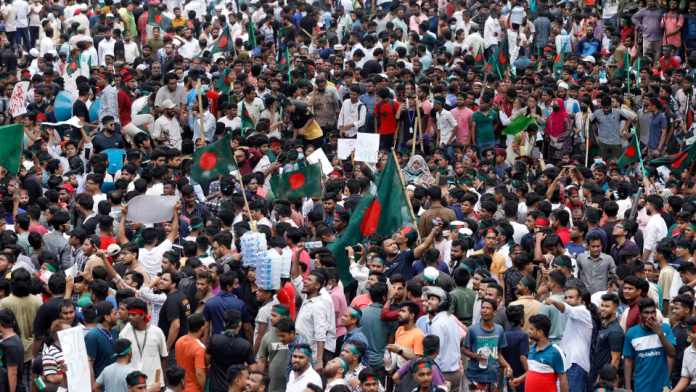Broadband internet and mobile phone services were cut off in Bangladesh, as anti-government protesters vowed to march on the capital to demand the prime minister’s resignation.
Dozens of people died in violence over the weekend, with the military ordering an indefinite curfew, according to Asian media.
Prime Minister Sheikh Hasina faces her biggest political challenge since winning a fourth term in elections in January.
Demonstrations began with students demanding the abolition of a quota system for government jobs. However, clashes with police and pro-government activists turned violent, killing more than 200 people last month. This sparked new protests demanding accountability from the government, which escalated into calls for Hasina to resign.
At least 95 people, including some 14 police officers, were killed in Sunday’s clashes in the capital, according to Prothom Alo. Hundreds more were injured.
Authorities shut down mobile internet for the first time on Sunday in an attempt to quell the unrest, while broadband internet has been down since late Monday morning. It is the second internet shutdown in the country after protests turned deadly in July.
The curfew imposed by the military came into effect on Sunday night and extended to Dhaka and other divisional and district headquarters. The government had earlier imposed curfew with some exceptions in the capital and other places.
Mobile internet was cut off, with Facebook and messaging apps including WhatsApp inaccessible on Monday. Bangladesh has previously shut down internet services in areas affected by protests, using it as a measure to stifle dissent from opposition parties.
Prime Minister’s ruling Awami League party said the demand for her resignation showed that the protests had been taken over by the main opposition Bangladesh Nationalist Party and the now-banned Jamaat-e-Islami party.
How it started
The protests began last month when students demanded an end to the quota system that reserved 30 per cent of government jobs for the families of veterans who fought in Bangladesh’s 1971 war of independence against Pakistan.
When violence peaked, the country’s Supreme Court ruled that the veteran quota should be reduced to 5%, with 93% of jobs to be allocated on merit. The remaining 2 per cent would be allocated to ethnic minorities, transgender people and people with disabilities. The government has accepted the decision, but protesters continue to demand accountability for the violence, which they blame on the government’s use of force.
The Hasina administration accused opposition parties and their student branches of inciting the violence, in which several government offices were also set on fire or vandalised. However, Mirza Fakhrul Islam Alamgir, secretary-general of the main opposition party, repeated a call for the government to step down to stop the chaos.
Hasina offered to speak to student leaders on Saturday, but the coordinator refused and announced a one-point demand for her resignation. The prime minister repeated her promises to investigate the deaths and punish those responsible for the violence. She said she was ready to sit down whenever the protesters wanted.
The protests have been a major test for Hasina, who has ruled the country for more than 15 years. She returned to power for a fourth consecutive term in January in an election that her main opponents boycotted.
